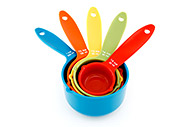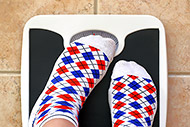
You changed your diet, but you don’t exercise.
Research shows that reducing calorie intake alone is more effective for weight loss than exercise alone, but combining these approaches leads to long-term success. It can be tough to fit exercise into an already busy schedule, but the boost in metabolism you get from burning extra calories and building muscle makes it worth the effort. If the scale is stuck despite your healthy eating, add walking, jogging, dancing, or strength training to your routine to boost the calories you burn each day. (See How to Lose Weight: Diet or Exercise?)
You aren’t eating enough.
It’s true that weight loss results when you eat fewer calories than you burn through activity, but your body needs fuel for energy. When you drastically reduce your calorie intake, you can send your body into starvation mode which causes it to conserve energy and stall weight loss. Other symptoms include a loss of muscle mass and feelings of exhaustion. The American College of Sports Medicine (ACSM) advises that women should consume no fewer than 1200 calories per day, and men no fewer than 1700 calories per day. It’s important to find a balance of food intake and exercise that keeps you full and energetic while also creating the calorie deficit you need for weight loss.
You are dehydrated.
Research shows that dehydration can cause a drop in metabolism. Drinking plenty of water keeps the series of reactions that support a healthy metabolism running smoothly. If you are unsure of how much water you should drink each day, see our post for calculating your daily recommended water intake.
You eat a low-nutrient diet.
Your metabolism is composed of a series of chemical reactions that rely on a variety of nutrients from the foods you eat. When you are trying to lose weight, it is easy to focus only on calorie intake. Unfortunately, some foods that are low in calories provide very few nutrients. Popular diet foods like rice cakes, diet sodas, packaged diet snacks and desserts, and sugar-free candies may help you lower your calorie intake, but they do little for your nutrition and health. Focus your meals on low-calorie, nutrient-rich foods like fruits and vegetables and include high-protein, fiber-rich foods like beans, nuts, and seeds. You will feel fuller and more satisfied with plenty of energy for activity, which will also help boost your metabolism.
You sit too much.
When you are sitting, your major muscles aren’t moving, which slows your metabolism. While regular workouts help, it is also important to avoid extended periods of sitting. This can be challenging if work requires you to sit at a desk all day, but aim to squeeze in movement when you can. Stand up often, stretch at your desk, take an extra lap around the office during your break, or climb a flight of stairs every hour or two. Regular movement will keep your metabolism from slowing and stalling your weight loss efforts.



 8 Ways to Overcome a Lack of Support for Weight Loss
8 Ways to Overcome a Lack of Support for Weight Loss
 6 Tips for Controlling Portions
6 Tips for Controlling Portions
 Some People Dream of Success
Some People Dream of Success
 5 Breakfasts Under 300 Calories
5 Breakfasts Under 300 Calories
 4 Things to Know About Negative Calorie Diets
4 Things to Know About Negative Calorie Diets
 Healthy Ways to Motivate Your Friends
Healthy Ways to Motivate Your Friends
 How to Make Healthy Restaurant Choices
How to Make Healthy Restaurant Choices
 How Often to Weigh
How Often to Weigh

 Pinterest
Pinterest RSS Feed
RSS Feed